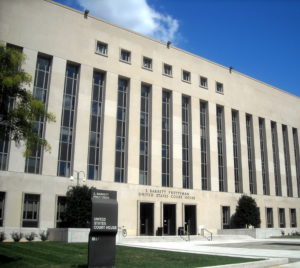Disciplinary Action of Assistant Attorney General
 Credit: APK, https://commons.wikimedia.org/wiki/File:E._Barrett_Prettyman_Federal_Courthouse,_DC.jpg
Credit: APK, https://commons.wikimedia.org/wiki/File:E._Barrett_Prettyman_Federal_Courthouse,_DC.jpg

Credit: APK, https://commons.wikimedia.org/wiki/File:E._Barrett_Prettyman_Federal_Courthouse,_DC.jpg
The Court of Appeals for the District of Columbia, in a March 15, 2024 decision, denied the Office of Disciplinary Counsel’s (ODC) motion to enforce a subpoena issued to Attorney Clark, who had served as an Assistant Attorney General in the United States Department of Justice (DOJ). The subpoena sought documents relating to any evidence of irregularities during the 2020 presidential election.
Attorney Clark faced disciplinary charges filed against him by the ODC, which are still pending before the District of Columbia (Board). With regard to that action, the ODC issued a subpoena. Attorney Clark objected to the subpoena, arguing that this Board was not able to discipline for any alleged professional misconduct as a Department of Justice official pursuant to 28 U.S.C. Section 530B. Attorney Clark further argued that the subpoena infringed upon his Fifth Amendment right not to be “compelled in any criminal case to be a witness against himself.” Initially, the motion to enforce the ODC subpoena was granted; however, subsequent to further oral arguments, the Court denied the motion, ruling that enforcement of the subpoena would violate Attorney Clark’s Fifth Amendment privilege against self-incrimination.
Formal disciplinary proceedings were initiated by the ODC against Attorney Clark in July 2022, including allegations that he ‘attempted to engage “ in conduct involving dishonesty that would seriously interfere with the administration of justice” while serving as an Assistant Attorney General for the DOJ and violated D.C. Rules of Professional Conduct 8.4(a), (c), and (d). The allegations arose during congressional investigations related to the Electoral College Vote, particularly related to the results of the 2020 election. During the investigation, allegations arose against Attorney Clark, including that he drafted a letter falsely asserting that the DOJ had concerns regarding the outcome of the election in Georgia, urging a special session of the Georgia legislature to address concerns, and then urged his superiors to sign the letter. During this same time, Attorney Clark was allegedly contemplating an offer by President Trump to serve as Acting Attorney General and would send the letter if appointed. However, Attorney Clark was never appointed, and the letter was never signed by his superiors nor sent.
With respect to jurisdiction, the Court determined that, given Attorney Clark holds a license in the District of Columbia, he is subject to jurisdiction and any acts or omissions that were in violation of the Rules of Professional Conduct “shall be grounds for discipline, whether or not the act or omission occurred in the course of an attorney-client relationship.” In fact, there is no exemption or immunity from discipline that would apply, even while serving as an attorney for the federal government. (See, McDade Amendment, 27 U.S.C. Section 530B).
While the Court does have jurisdiction, the Court recognizes that the Fifth Amendment states that “[n]o person . . . shall be compelled in any criminal case to be a witness against himself” in any “civil, criminal, administrative, judicial, or other proceeding and protects against disclosures that may be reasonably believed to be used in criminal prosecution, or to other evidence that might be used.” Still, a person may be required to produce documents. Here, the Court concluded that Attorney Clark did correctly assert an “act-of-production privilege” in response to the subpoena. The documents requested related directly to the central charges against Attorney Clark in the pending indictments and clearly “would have a potentially incriminating ‘testimonial aspect’” in that such requests would have required Attorney Clark to be a witness against himself and entitled him to invoke the Fifth Amendment privilege.
Court denied the ODC motion to enforce the subpoena.
